Elizabeth Thomas exposes how it feels to be a woman in a man’s world.
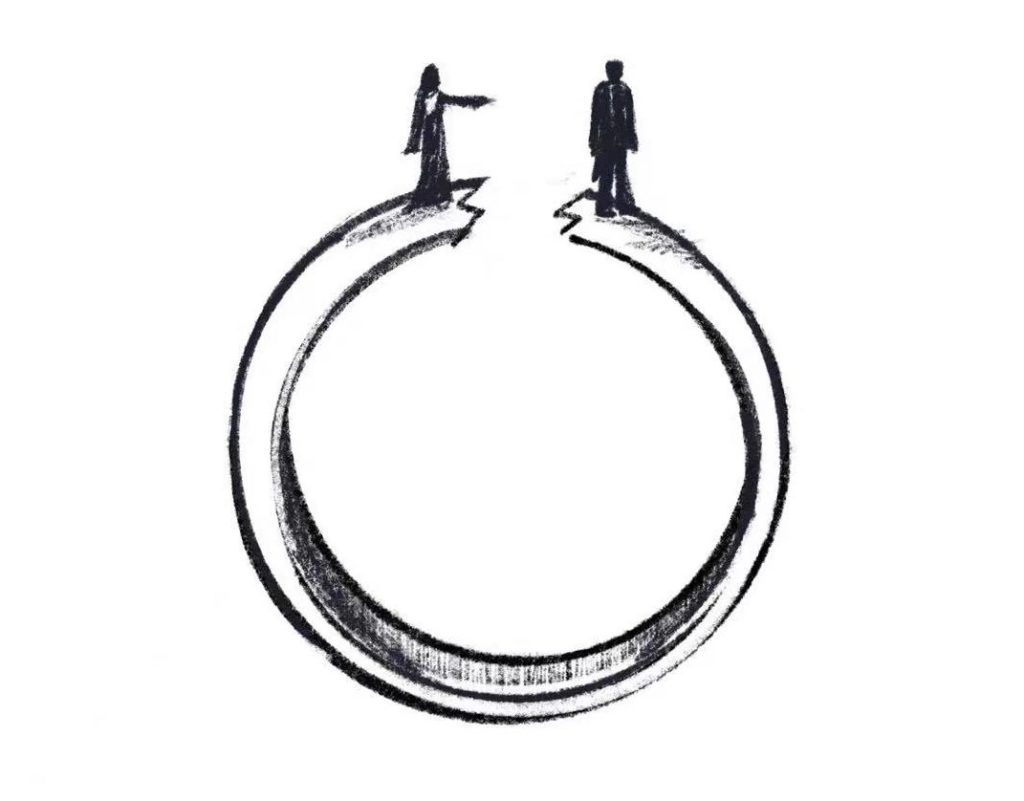
“Your verses were, I thought, too good to be a Woman’s”
John Dryden, English Poet, in a letter to Elizabeth Thomas
Today’s poem, The Forsaken Wife, is both an attack on an unfaithful man and a pointed riposte to the very real way women were controlled in English society, circa 1722. In this, the year of the poem’s composition, women’s concerns were not always deemed fit subjects for poetry, and it was extremely difficult for women writers to be published. In fact, Thomas wrote under the pen name Corrina, which may not have hid her gender, but certainly concealed her true identity from any in her circle of acquaintances who may have been scandalized by her forthright views on matters between men and women. Before we begin to get into the poem too far, it should be mentioned that The Forsaken Wife presents a fictional situation – the unfaithful husband who runs off with another woman here bears no resemblance to Elizabeth’s real-life fiancé, Richard Gwinnet, to whom she was engaged for 16 years until his untimely death in 1716. However, in a world in which women’s voices were often silenced, and getting married was akin to a transfer of property from the father to the husband, Thomas dares (a word repeated twice in the third verse) to shine a light on the pain that a man’s indifferent and irresponsible treatment of his wife has caused. Elizabeth’s poem reveals thoughts that were often concealed behind a mask of propriety that women were forced to wear by a society that strictly prescribed what they could and couldn’t say, and how they could and couldn’t act:
Methinks ‘tis strange you can’t afford
One pitying look, one parting word.
Humanity claims this as its due,
But what’s humanity to you?
Cruel man! I am not blind;
Your infidelity I find.
Your want of love my ruin shows,
My broken heart, your broken vows.
Yet maugre all your rigid hate
I will be true in spite of fate,
And one preëminence I’ll claim,
To be forever still the same.
Show me a man that dare be true,
That dares to suffer what I do,
That can forever sigh unheard,
And ever love without regard,
I will then own your prior claim
To love, to honour and to fame,
But till that time, my dear, adieu.
I yet superior am to you. While Gwinnet himself was not directly responsible for her life’s difficulties, Elizabeth Thomas knew what it was to be a woman in a man’s world. Born in 1675 to a good family, her father unfortunately died when she was a baby, and so she and her mother faced financial hardship for the rest of their lives. Things got so bad for Elizabeth that, at one time, she was imprisoned for three years in Fleet gaol for being unable to meet her debts. She had made some money through publishing, but even this was not enough to stave off her sentence. By the year 1700 she had met and become engaged to Richard – but he died before they could be legally wed. Because they were not yet husband and wife, Richard’s family suppressed his will and Elizabeth never saw a penny of the money that might have come to her if they had been married. She could not even pay the legal fees from this dispute! However, given that Elizabeth herself was not married, it might be safe to assume the cheating slime-ball in the poem is a fictional creation, perhaps inspired by the behaviour of somebody in her social circle or in society at large.
That men can be unfaithful (the word infidelity in verse two means to break the promise made on the occasion of a wedding) is one thing; what really gets Elizabeth’s goat is men’s total lack of courage when it comes to fronting up about their actions. Once her speaker discovers her husband has been cheating behind her back (your infidelity I find) he decides to leave her – but won’t even look her in the eye and admit what he’s done. Without another word, he’s gone. There’s a touch of irony in her tone of voice when she describes the way he just slinks away; strange you can’t afford… a parting word, as if having known him for some time it’s not strange at all, but exactly the kind of classless behaviour she has come to expect! He can’t – or won’t – even grant her the dignity of an admission or apology, and it’s for this reason that she accuses him of lacking humanity. For Elizabeth’s speaker, having the ability to empathise and recognise pain in another person is what elevates people above the level of beasts. Her erstwhile husband cannot even muster this simple human quality. At the end of the first verse she asks a rhetorical question, But what’s humanity to you?, knowing that she’s not going to get an answer as he flees into the distance. The indifference with which he callously tosses her aside hurts more than the act of infidelity itself.
While we know that the husband in this poem is likely fictional, Elizabeth is making a wider point about the historical ways in which arrogant men have treated women. She often wrote about women’s issues and her speaker in this poem displays all the shrewd characteristics of a smart person constrained by a hypocritical society that allowed men to behave in certain ways, but instinctively censured and controlled women. I get the impression that the speaker knew that her husband would cheat on her all along. But when he confirms her suspicions, it’s so completely flagrant – did he even try to hide it? She’s angered by his assumption that she wouldn’t find out: I am not blind, she huffs indignantly, as if he’s acting right under her nose and thinks she’s too stupid to notice anything! Throughout the poem, he is painted in less-than-flattering colours and his emotional range is limited to either indifference (when he leaves he doesn’t even look at her), unkind emotions such as hate and cruelty, or a complete lack of any emotional capacity at all, such as in the phrase want of love (in this context want means ‘lack of’). In verse three, Thomas extends her criticisms beyond her own experience to include other men who are unable to remain faithful, adding cowardice to the roll-call of accusations against them: show me a man who dares be true, that dares to suffer what I do. Here, at the beginning of the third verse, the speaker shifts from her specific misfortune to the perfidy of men in general, and it suddenly feels like when Thomas writes I or me she wants her Forsaken Wife to stand for all faithful women who have suffered a similar indignity; similarly, you is now emblematic of all men with wandering eyes and inconstant hearts.
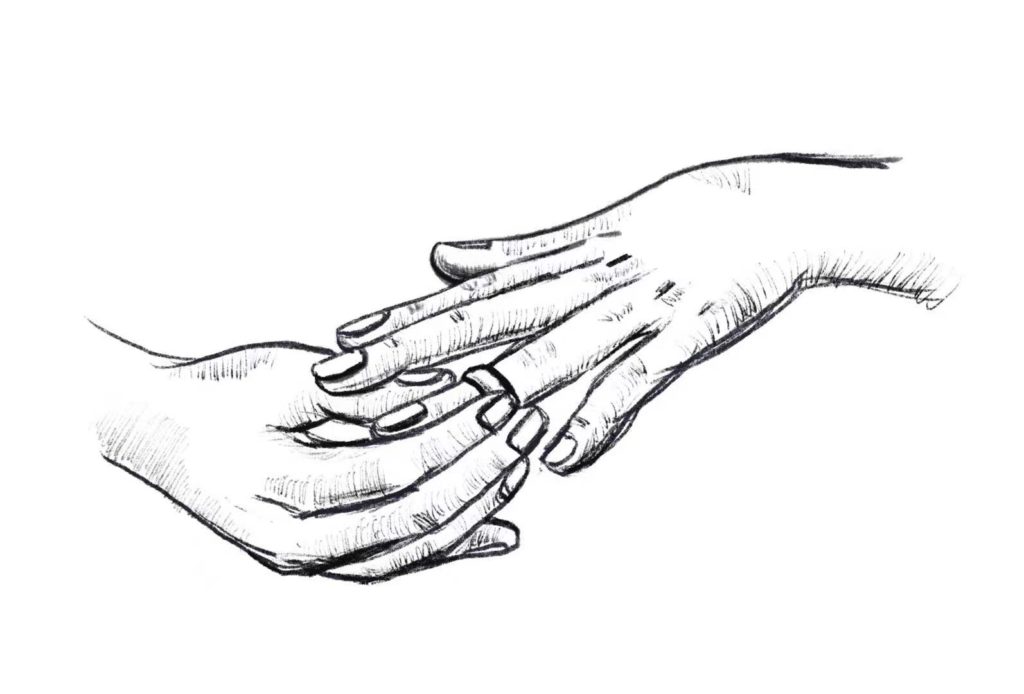
Therefore, despite suffering the cruellest indignity, the speaker marshals her considerable reserves of emotional strength and determines to rise above the treatment meted out by her erstwhile husband – she refuses to be dragged down to his level. The first word of the poem serves to differentiate her from him: methinks. As opposed to him, she is capable of ‘thought’ and restraint in action (I will be true in spite of fate). Forever sigh unheard implies that, no matter how deep the cut, she won’t flinch in front of others – a level of emotional control beyond anything he displays. It’s important to juxtapose this unwillingness to betray emotion with his total lack of emotion – they are not the same thing at all. Thomas goes to great lengths to create a binary opposition between the husband and wife, seen most clearly in the opposing diction of words such as I vs you, love vs hate, infidelity vs true. The line My broken heart, your broken vows exemplifies this opposition: the structure of this line consists of two phrases which are grammatically identical (this kind of structure is a parallelism) and separated by caesura, a comma which functions as both a mirror and a visual separator; husband and wife stand on either side of the divide. In case anybody is in any doubt, repetition of the word broken further suggests cause and effect: her heart was broken as a result of his callous disregard. The line Your want of love my ruin shows doubles down on this juxtaposition, explicitly ascribing her emotional devastation to his indifference.
In actual fact, her claim to stoicism is an effective reversal of the way we might expect men and women to behave. Men are supposed to be the strong ones, able to control their emotions and actions both. Women are supposed to be fragile, easily wounded, and hysterical – unable to conceal emotional pain. But Elizabeth Thomas’ speaker is neither of these. The careful and controlled form of the poem is an effective way of conveying her inner determination and strength. A closer look at the first verse is sufficient, as the patterns she establishes here continue through the whole poem:
Methīnks/ ‘tis strānge/ you cān’t/ affōrd/ One pī/ (ty) ing lōok,/ one pārt/ ing wōrd./ Humān/ ity clāims/ this ās/ its dūe,/ But whāt’s/ humān/ itȳ/ to yōu?/
The poem is largely written in lines of iambic tetrameter (four pairs of de-dum beats in every line; the strong stressed beats are marked with an accent in the verse above) and Thomas employs rhyming couplets to suggest not only the binary opposition of man and woman again, but to hearken back to the idealised pairing of man and woman in marriage, a situation that has here been destroyed. Such a high level of technical mastery is meant to convey a controlled impression of Thomas’ speaker – despite suffering such poor treatment and severe emotional wounds, she’s more than capable of holding it together.
Actually, she does more than hold it together – she uses all-out attack as the best form of defence. Arguably, the poem’s most notable feature is its angry, accusatory, recriminatory tone of voice (which conveys a speaker’s attitude towards her subject matter; in this case, her cheating, adulterous ex). An efficient way of establishing tone is to employ certain types of alliteration. The poem features an example of plosive alliteration early on: pitying / parting. Speak this line out loud and, when you get to these words, expel as much air as you can through your closed lips. Plosive is meant to feel like a punch of air, a release of pent-up, negative emotion, conveying the attitude and emotions of Thomas’ speaker. The repetition of consonant sounds within words as well as at the beginning of words is called consonance and from here on Thomas employs both alliteration and consonance to sharpen her tone till it could cut like a knife. Nowhere is this more evident than at the start of verse two. Right off the bat we get a hard, guttural C sound (Cruel), echoed by the K in broken (twice) and in claim. Broken heart and broken vows brings plosive B into the mix, and this angry percussive sound strikes once more at the start of the word preëminence. Dental (the use of hard D and T) is most strongly audible in the first two lines of verse three (…dare be true, That dares to suffer what I do) giving these words a deliberate cutting edge.
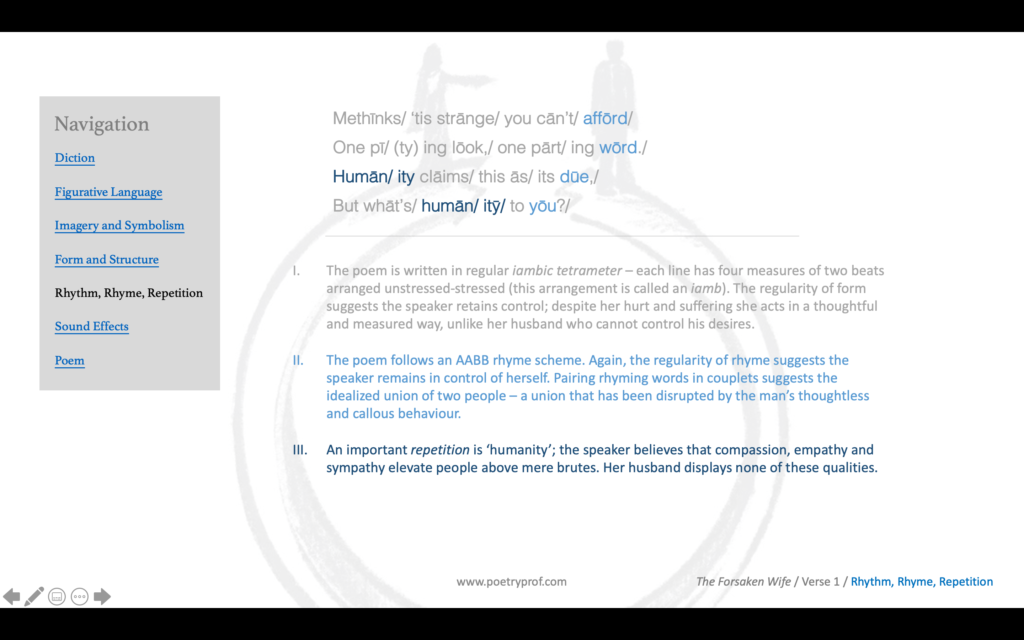
As in these examples from the end of the poem, it’s not all unfettered anger. While the first four lines of verse two see the speaker at her most vehement, strongly accusing and attacking her husband, notice how the word yet in the very middle of this stanza signals a turning point. A volta is a sudden shift in direction or tone and, at this moment, the forsaken wife seems to audibly take control of herself. She determines to rise above the cruel and petty behaviour meted out by the man, and makes her own vow: to claim the moral high ground (preëminence I’ll claim). He sets an example of infidelity and inconstancy whereas she swears to be forever still the same. Now her voice is edged with steel. She uses the modal verb will to indicate her newfound determination and speaks in the imperative tense (to be). The second verse ends with a balanced composition, still the same, where the soft, measured alliteration suggests that she has managed to reign in her anger; till that time creates a similar impression. Although rage, understandably, still simmers under the surface, unlike him, she is capable of restraint and self control.
An incendiary moment occurs in the third stanza when the speaker usurps the supposed responsibility of men by assuming the language of their broken marriage vows for herself, in particular to love and to honour. Because her cheating husband has abrogated these responsibilities, the speaker emasculates him by co-opting this language for herself. It’s easy to overlook such small words, but own and claim remind us that marriage was more of a transfer of property between father and husband, who can be thought of as ‘owning’ a woman as if she was a piece of baggage. In this context, the entire poem can be seen as a daring act of emasculation – the robbing of a man’s traditional power and status by a woman. Central to this interpretation is Thomas’ use of iambic meter again. Despite one or two irregularities that we’ll get to later, Thomas is careful to end each line on an iambic beat; in other words, every line ends with a stressed syllable. Today we use the terminology rising rhythm to describe lines ending like this (and falling rhythm to describe lines ending in an unstressed syllable) but in Thomas’ day poets spoke in gendered language and called these metrical arrangements masculine and feminine! Masculine referred to any lines ending in a strong, stressed beat; lines ending in a feminine downbeat were said to have weak endings. By presenting us with only rising rhythm (all her lines end on masculine upbeats) Thomas subtly implies a core of strength and self-control in the persona of the speaker that is conspicuously lacking in the spineless spouse. In this light, the speaker’s use of the word dares when describing herself subverts a quality like courage, conventionally associated with men, and applies it to women who are able to bear suffering stoically, without complaint, instead.
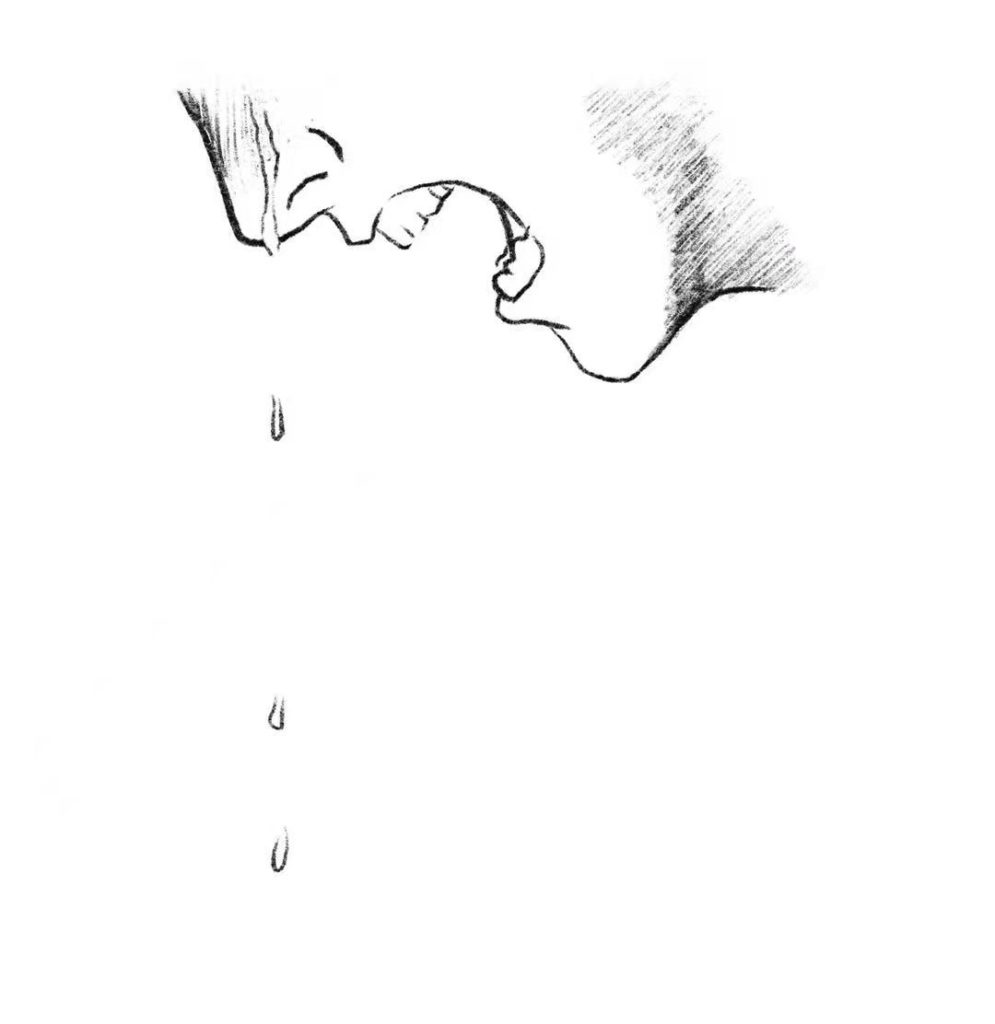
However, not showing emotion is not the same as not having emotion and, as we have seen already, the speaker admits to emotional ruin. And the very same technical features that suggest mastery of emotion also allow little glimpses of hurt to shine through the cracks. Take that iambic rhythm and look how, at the very beginning of the second verse, the phrase Cruel man! is not really iambic. The technical name for a measure of poetry that consists of two stressed beats is a spondee: both words carry equal weight and the way she spits them out so vehemently is emphasized by an exclamation mark. The same goes for rhyme. We have already noticed the way rhyming couplets suggest the ideal union of two people: man and woman standing together as husband and wife. But you’ve probably already noticed that three of these pairs don’t quite rhyme: afford / word, shows / vows, and unheard / regard all feature unrhymed vowel sounds. Variation in either vowel or consonant sounds create half-rhymes or slant-rhymes; these types of rhyme are effectively used to suggest both the disruption between husband and wife and, more subtly, the emotional pain that this disruption has caused.
Too, don’t underestimate the connotations of the title: the word forsaken means something like ‘abandonment’, and connotes deeper feelings of being totally forgotten or left completely behind, bereft of any hope at all. The use of the denominative wife rather than ‘woman’ or ‘lady’ reminds us that, in 1722, a woman’s identity was completely bound up in who she was married to. The mention of Elizabeth Thomas’ pen name Corinna in the by-line to this poem is a subtle reminder of the way a woman often takes the man’s surname when marrying, as if her identity is transformed by and subsumed into his. Thomas was given this pseudonym by Dryden after she sent him two of her poems. He praised them with the barbed compliment that they were so good he doubted they had been written by a woman! The wedding vows that our speaker’s husband so thoughtlessly broke were meant to guarantee some kind of security and safety, dearly bought. Remember, the options for a woman after suffering situations like this would have been limited indeed. Thomas’ forsaken wife is strong, but she has been battered and nearly broken by this awful experience.
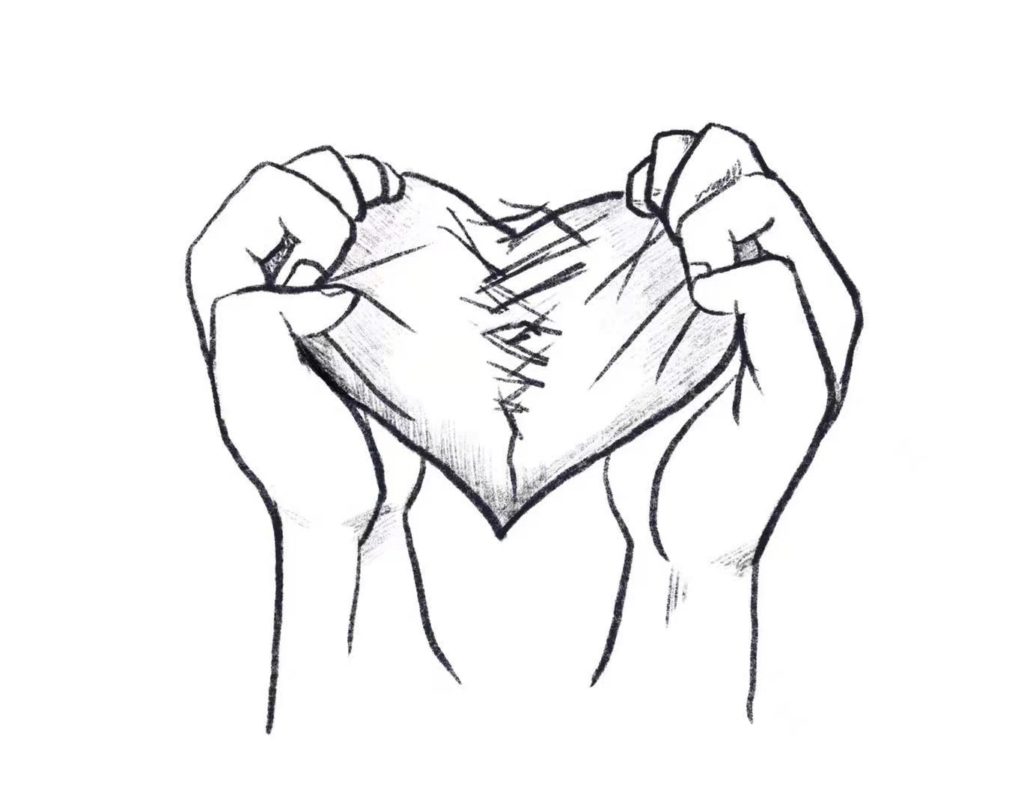
The end of the poem deserves a little more attention, and it’s possible to read both unbearable hurt and newfound resolve into the way she says: But till that time, my dear, adieu. On one hand, Thomas’ choice of word (diction) adieu, couches her anger in civil terms. Taken from French, a language associated with refinement and sophistication, it’s as if by adopting a higher register the wife can rise above the pain of her riven emotions and position herself above the petty actions of her husband. The collection of vowels (a, e, i and u) softens the sound of the word adieu (compare these sounds to those in the English word goodbye, which contains three hard consonants). But perhaps you might think there’s an element of disguise going on here too – remember, throughout the poem, she has taken pride in her ability to be stoic, weather any storm, remain undiminished even in the face of cruellest provocation. Does this word, and the flippant way she says my dear, hide an admission that some pains are too hurtful to bear? Or you might conclude that her anger and bitterness subside in the face of her impressive determination; the genuine pain of heartbreak, regret that the man she loves no longer loves her in return, fear at what is to become of a forsaken woman in the future – all falls away behind her as if no longer of any consequence.
By the last line of the poem, any glimpses of a deep, emotional wound – the subtle feel of a rhythmic change, an uncomfortable half rhyme, the length of a single word – have passed, and she has collected her battered and bruised ego. Bowed but not cowed, the very last line (I am yet superior to you) asserts the preëminence of the constant wife over her unfaithful husband, resumes the pattern of emasculation we’ve seen throughout (that masculine rhythm again), and reiterates the poem’s central I vs you opposition, putting all unfaithful men firmly in their place – at the end of the line.
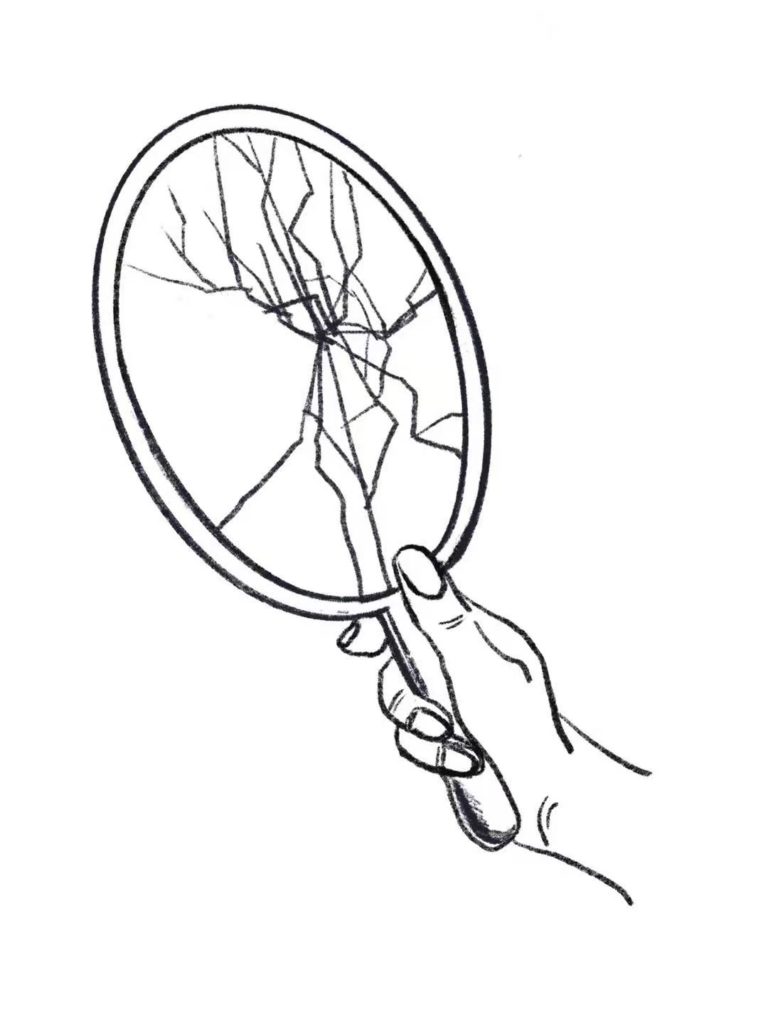
Suggested poems for comparison:
- They Shut Me Up in Prose by Emily Dickinson
Like Elizabeth Thomas, Emily Dickinson was writing in a time when women were strictly restrained by social convention. In this short poem Dickinson describes being locked up in a room – but escapes using her imagination and mocks a dull and boring society that tries to repress her.
- In An Artist’s Studio by Christina Rosetti
A model poses for an artist who makes her dress up and poses her in ways that demean her. A famous and widely appreciated poem about the way men treat women as disposable objects for their own pleasure – just like the husband in The Forsaken Wife.
- One Art by Elizabeth Bishop
In this quietly devastating poem, Bishop’s speaker assures us that she’s okay about losing things (her keys, her house, even her loved ones). But the more she insists that she can learn to live with her losses, the more we might suspect she’s not as indifferent as she might seem…
Additional Resources
If you are teaching or studying The Forsaken Wife at school or college, or if you simply enjoyed this analysis of the poem and would like to discover more, you might like to purchase our bespoke study bundle for this poem. It costs only £2 and includes:
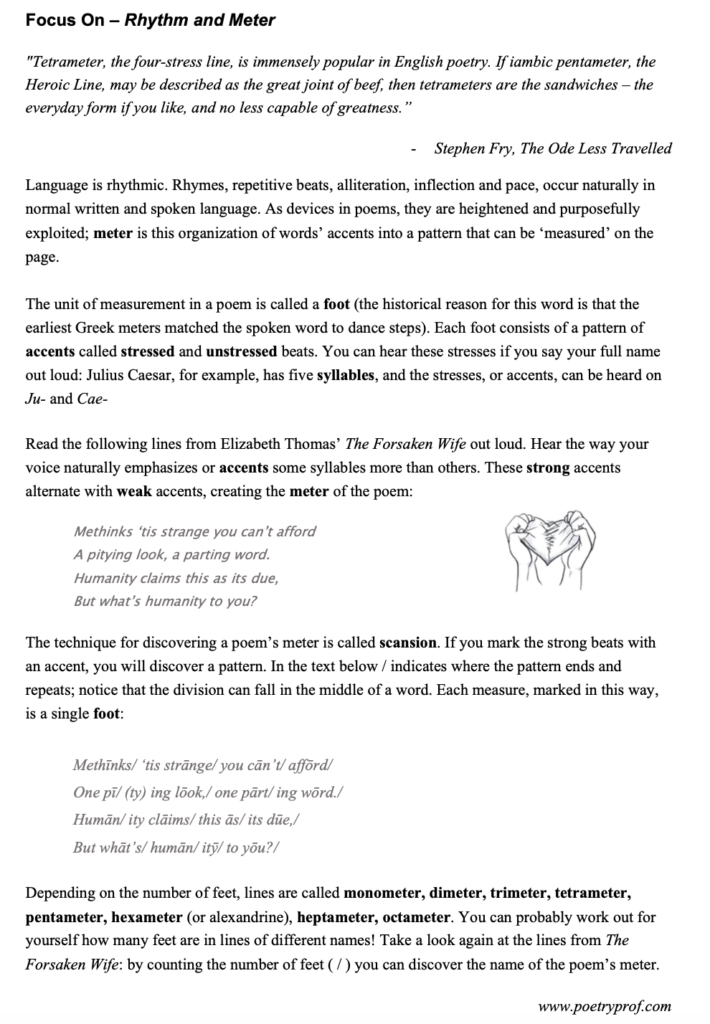
- Study Questions with guidance on how to answer in full paragraphs.
- A sample Point, Evidence, Explanation paragraph for essay writing.
- An interactive and editable powerpoint, giving line-by-line analysis of all the poetic and technical features of the poem.
- An in-depth worksheet with a focus on explaining rhythm and meter.
- A fun crossword quiz, perfect for a starter activity, revision or a recap.
- A four-page activity booklet that can be printed and folded into a handout – ideal for self study or revision.
- 4 practice Essay Questions – and one complete model Essay Plan.
And… discuss!
Did you enjoy this analysis of Elizabeth Thomas’ The Forsaken Wife? Do you agree that the poem goes someway towards reclaiming a voice for silenced women? How do you feel about the man in the poem? Why not share your ideas, ask a question, or leave a comment for others to read below. For daily nuggets of analysis and all-new illustrations, find and follow Poetry Prof on Instagram.
I love the analysis .She does manage to caricature the man(men) for their obvious failing of not only the woman in their life but of humanity in general . The societal constraints placed on the woman(women ) is castigated and mankind is brought to account for how he constructs the world view of both men and women to the detriment of all. I love how the woman is elevated and celebrated albeit in her suffering and expression of pain . I see a brilliant satire on how marriage vows are undermined and yet it’s a scared institution alongside love which is meant to be treated with deference. But alas…. The woman always bears the brunt . Thank you for your brilliant analysis .